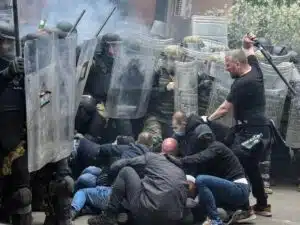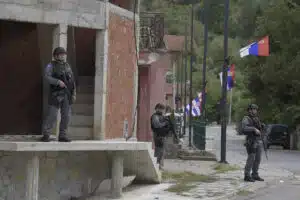Brussels – There is still no solution to the crisis between Pristina and Belgrade over the exclusive use of the euro in Kosovo for official payments, exacerbating relations as the end of the transition period approaches. The European Union, through its special representative for the Belgrade-Pristina dialogue, Miroslav Lajčák, is trying to push for a way out – after expressing “concerns” for the impact onthe Serbian community in Kosovo earlier this year – but for now, no step forward seems to have been made by the two governments to get the dialogue back on track.

“Our long discussions helped to clarify important details. Next week we agreed to reconvene with the ambition to find a solution,” the EU Special representative said yesterday (March 25) at the end of the meeting with the Chief Negotiators of Serbia and Kosovo (Petar Petković and Besnik Bislimi, respectively). Lajčák does not shy away from an optimistic view of the Pristina-Belgrade dialogue, even though, one year after the Ohrid Agreement, there is very little to cheer about concerning the discussion on the “proposals on how to proceed for those affected by the Central Bank of Kosovo’s Regulation on Cash Transactions.”
With the entry into force of the Regulations on Transparency and Stability of Financial Flows and Combating Money Laundering and Counterfeiting, as of February 1, the euro became the sole currency of exchange and deposit in bank accounts: the Serbian dinar can still be exchanged on a par with the Albanian lek or the dollar for private transactions, but the decision will impact all those public services that never adapted to Pristina’s adoption of the euro in 2002 (even before independence). To enable the Serbian minority in the north of the country to adapt to the new arrangements, Albin Kurti’s government set a three-month transition period for the rules to take effect, offered free euro bank accounts, and provided facilities for the National Bank of Serbia to convert dinars into euros. But from Belgrade, the only response — besides the non-recognition of Pristina’s sovereignty — concerns the need to create the Association of Serb-majority municipalities in Kosovo, i.e., the community in the country that should be granted autonomy on a whole range of administrative matters (including the operation of the Serbian Bank, Savings Banks, and Post Offices).
A Year of Escalation between Kosovo and Serbia
Ten months have passed since May 26, 2023, when the first event triggered one of the most complex and violent years for relations between Serbia and Kosovo. After the newly elected mayors of Zubin Potok, Zvečan, Leposavić, and Kosovska Mitrovica took office, violent protests erupted, turning into guerrilla warfare on May 29, also involving soldiers from the international NATO-led KFOR mission. Tensions erupted over the Kurti government’s decision to send special police forces to allow mayors elected on April 23 into town halls in a controversial election round that saw very low voter turnout.

Clashes between Kosovo Serb protesters and NATO’s KFOR mission soldiers in Zvečan, May 29, 2023 (credits: Stringer / Afp)
Meanwhile, on June 14, Serbian security services arrested/kidnapped three Kosovo policemen whom the governments of Pristina and Belgrade each accused of trespassing. Brussels convened an emergency meeting with Kosovar PM Kurti and Serbia’s president, Aleksandar Vučić, to get out of “crisis management mode.” The three Kosovar policemen were released only on June 22. But due to Pristina’s failure to take a “constructive attitude” to de-escalate the tension, Brussels imposed in late June “temporary and reversible” measures against Kosovo (still in place, despite the roadmap agreed on July 12). However, the situation escalated with the terrorist attack on September 24 near the Serbian Orthodox monastery in Banjska when clashes between the Kosovo Police and a group of about 30 gunmen, a policeman, and three attackers were killed.
Developments in the attack showed clear connections to neighboring Serbia. The bombers outside the monastery included Milan Radoičić, deputy head of Lista Srpska – as he confirmed a few days after the armed attack – as well as Milorad Jevtić, a close associate of the Serbian president’s son, Danilo Vučić. Aggravating the situation was a “major military deployment” by Serbia along the administrative border, a move that the United States denounced. The threat has not materialized, but the EU has begun to reflect on the ability to impose the same measures in force against Pristina on Belgrade. But to do so requires a unanimous green light needed in the Council and Vučić’s closest ally inside the Union – Hungarian premier Viktor Orbán – is vetoing the move. As if that were not enough, before early elections in Serbia on December 17, the last act of the government led by Ana Brnabić was to send a letter to Brussels to warn that Serbian institutions do not recognize the legal value of the verbal commitments made in the context of the Pristina-Belgrade dialogue and that they will not recognize the de facto sovereignty of Kosovo.
 The only positive news, for now, is the resolution of the ‘battle of the license plates’ between Serbia and Kosovo, thanks to the decision between late 2023 and early 2024 on mutual recognition for vehicles entering the border. Even given the unpromising assumptions on which the new year is being set. In addition to the entry into force of the Regulation on the Transparency and Stability of Financial Flows, the special police operations conducted on February 5 at the offices of the temporary institutions run by Serbia in four municipalities in northern Kosovo (Dragash, Pejë, Istog, and Klinë) and at the headquarters of the NGO Center For Peace and Tolerance in Pristina also raised controversy in Brussels: since 2008, Belgrade has continued to fund municipalities, businesses, public enterprises, kindergartens, schools, public universities, and hospitals available to the Serb minority, illegally according to the Kosovo Constitution.
The only positive news, for now, is the resolution of the ‘battle of the license plates’ between Serbia and Kosovo, thanks to the decision between late 2023 and early 2024 on mutual recognition for vehicles entering the border. Even given the unpromising assumptions on which the new year is being set. In addition to the entry into force of the Regulation on the Transparency and Stability of Financial Flows, the special police operations conducted on February 5 at the offices of the temporary institutions run by Serbia in four municipalities in northern Kosovo (Dragash, Pejë, Istog, and Klinë) and at the headquarters of the NGO Center For Peace and Tolerance in Pristina also raised controversy in Brussels: since 2008, Belgrade has continued to fund municipalities, businesses, public enterprises, kindergartens, schools, public universities, and hospitals available to the Serb minority, illegally according to the Kosovo Constitution.
Find more insights on the Balkan region in the BarBalkans newsletter hosted by Eunews
English version by the Translation Service of Withub








